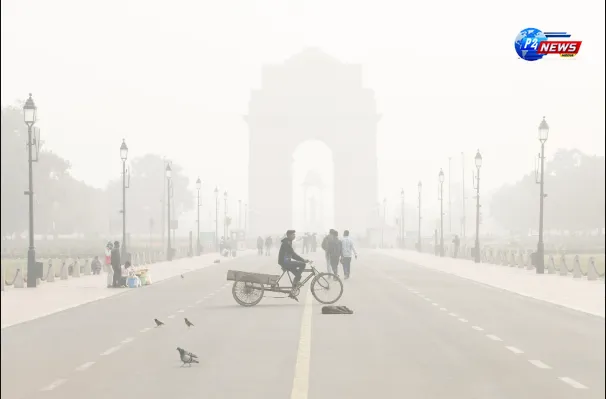Shortly after the CAQM implemented GRAP 3, air quality levels remained above 300, indicating significant pollution. This action reflects urgent measures to address deteriorating air conditions and protect public health.
Shortly after the CAQM implemented GRAP 3, air quality levels remained above 300, indicating significant pollution. This action reflects urgent measures to address deteriorating air conditions and protect public health.
In response to the worsening air quality in Delhi and the National Capital Region (NCR), authorities have enacted a ban on the movement of BS IV diesel and BS III petrol vehicles. The air quality index (AQI) in Delhi has plummeted further, exceeding the 400 threshold and entering the 'Severe+' category. This alarming shift prompted the Commission for Air Quality Management (CAQM), the centralized anti-pollution body, to enforce GRAP 4 regulations throughout the national capital and surrounding areas as of tonight.
The decision for heightened restrictions came shortly after the CAQM had already activated GRAP 3 earlier in the day when the AQI hovered above the 300-mark. The commission noted that unfavorable weather conditions, characterized by still winds and a low mixing height, were contributing to the deteriorating air quality. By 4 PM, the 24-hour average AQI reached 379, and it breached the critical 400 mark around 10 PM.
In light of the significant rise in pollution levels, the CAQM Sub-Committee convened an emergency meeting to address the situation. Following deliberations, it was determined that the immediate implementation of Stage IV of the GRAP was necessary to combat the severe air quality issues affecting the entire NCR.
As part of these measures, academic institutions in Noida have adjusted their schedules, with schools set to begin at 9 AM the following day due to both the extreme cold and elevated pollution levels. Schools will operate in a hybrid format, balancing both in-person and online learning.
The restrictions include a comprehensive approach to reduce pollution, which prohibits truck entry into Delhi and halts all construction and demolition activities affecting linear public projects, including roads, highways, and power transmission systems. Additionally, authorities are deliberating the possibility of limiting physical attendance in offices, suggesting that municipal and private workplaces could operate at 50% capacity while promoting work-from-home arrangements.
Furthermore, state governments may evaluate the need for supplementary emergency protocols, which could involve closing educational establishments and curtailing non-essential commercial operations. A system based on odd-even vehicle registration numbers may also be implemented to manage traffic flow and mitigate pollution.
Health advisories have been issued, urging vulnerable groups, particularly children, the elderly, and individuals with pre-existing health conditions, to avoid outdoor activities and remain indoors as much as possible. The ban on construction and demolition activities will be strictly enforced, especially for vital public infrastructure projects.
In recent weeks, the air quality in Delhi and its neighboring regions has remained consistently poor, prompting health warnings from medical experts and igniting a surge of petitions to the Supreme Court for government intervention. The court has been actively addressing the annual air quality crisis, holding multiple hearings focused on various contributing factors, including agricultural waste burning and ineffective vehicle bans.
Judges have expressed concern regarding the enforcement of regulations, particularly criticizing authorities for permitting non-essential construction projects when GRAP-IV was activated. Additionally, the court has scrutinized the actions of both the Delhi government and the CAQM for their failure to implement stricter measures once pollution levels crossed critical thresholds, especially above 300 on the AQI scale.
As efforts intensify to tackle the air quality crisis, the focus remains on ensuring compliance with regulations aimed at safeguarding public health and the environment. The ongoing situation underscores the urgent need for comprehensive strategies to address both short-term and long-term air pollution challenges in the region.
Like
Dislike
Love
Angry
Sad
Funny
Pray
'Trump Tracker: Tulsi Gabbard's Surprising Appointment as US Intelligence Chief
November 14, 20249th Ayurveda Day in Melbourne: A Celebration of Ayurvedic Innovations and Global Health Impact
November 10, 2024🍪 We Value Your Privacy and Experience Hi there! We use cookies to enhance your browsing experience, provide personalized content, and analyze site traffic. By continuing to use our site, you consent to our use of cookies.







Comments 0